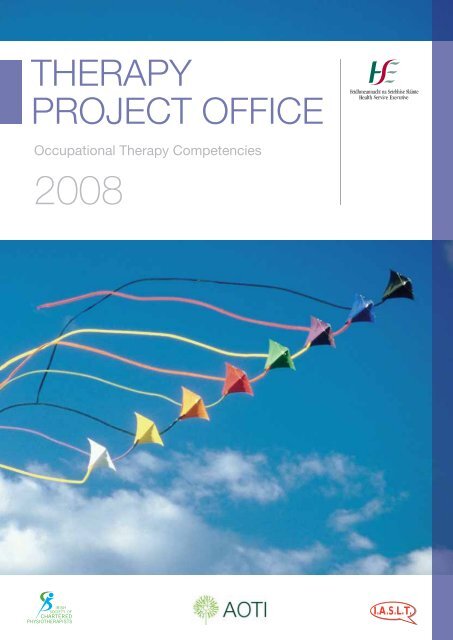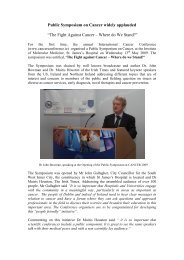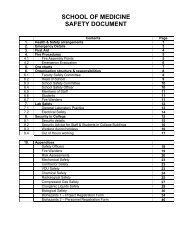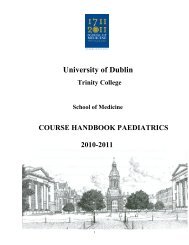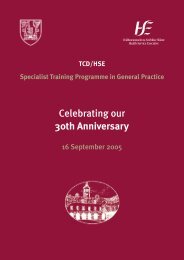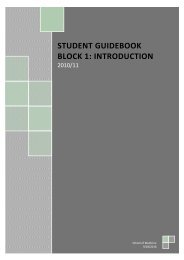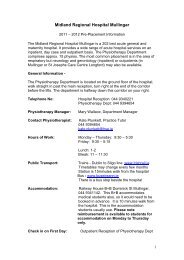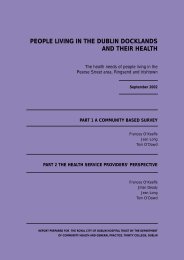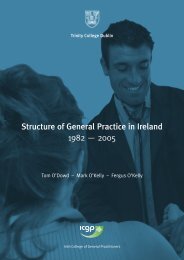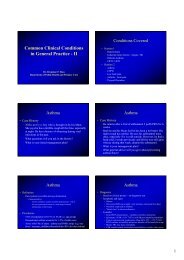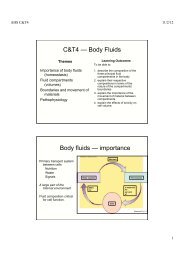therapy project office - School of Medicine - Trinity College Dublin
therapy project office - School of Medicine - Trinity College Dublin
therapy project office - School of Medicine - Trinity College Dublin
Create successful ePaper yourself
Turn your PDF publications into a flip-book with our unique Google optimized e-Paper software.
THERAPY<br />
PROJECT OFFICE<br />
Occupational Therapy Competencies<br />
2008<br />
I.A.S.L.T.
Contents<br />
4 Therapy Project Offi ce<br />
5 Introduction<br />
Project Process 5<br />
Competence 5<br />
Purpose 5<br />
Occupational Therapy Competencies Therapy Project Offices 3<br />
Navigation <strong>of</strong> Framework 6<br />
Chart 1: Framework <strong>of</strong> Competencies for Occupational Therapists in Ireland 7<br />
8 Occupational Therapy Graduate/Entry Level Competencies<br />
A. Pr<strong>of</strong>essional Practice 8<br />
B. Providing a Quality Service 9<br />
C. Education and Development 10<br />
11 Occupational Therapy Senior Competencies<br />
A. Pr<strong>of</strong>essional Practice 11<br />
B. Providing a Quality Service 13<br />
C. Education and Development 15<br />
16 Occupational Therapy Clinical Specialist Competencies<br />
A. Pr<strong>of</strong>essional Practice 16<br />
B. Providing a Quality Service 18<br />
C. Education and Development 19<br />
21 References<br />
23 Appendices<br />
Appendix 1: Project Process for Entry Level Competencies 23<br />
Methodology 24<br />
Project Process for Senior Grade and Clinical Specialist Competencies 24<br />
Methodology 24<br />
Clinical Specialist Competencies 24<br />
External Input 25<br />
Validation 25<br />
Appendix 2: Membership <strong>of</strong> Pr<strong>of</strong>essional Competencies Working Groups 25<br />
Occupational Therapy Graduate/Entry Level Competencies Working Group 25<br />
Occupational Therapy Senior Competencies Working Group 25<br />
Occupational Therapy Clinical Specialist Competencies Working Group 25<br />
Contents
4 Occupational Therapy Competencies Therapy Project Office<br />
Therapy Project Office<br />
Therapy Project Offi ce<br />
The Therapy Project Offi ce was established in January 2007 to progress<br />
and initiate <strong>project</strong> activities on behalf <strong>of</strong> the National Implementation<br />
Group (NIG) for Clinical Placement Provision for Occupational Therapy,<br />
Physio<strong>therapy</strong> and Speech & Language Therapy. The <strong>project</strong>s related<br />
to a number <strong>of</strong> key actions identifi ed by the ‘The Report <strong>of</strong> the National<br />
Planning Group on Clinical Placement Provision for Occupational Therapy,<br />
Physio<strong>therapy</strong> and Speech and Language Therapy’ (2004), under the three<br />
broad areas <strong>of</strong>:<br />
� Practice Education<br />
� Continuing Pr<strong>of</strong>essional Development<br />
� Quality Information for the Public<br />
The Therapy Project Offi ce was funded by the HSE and staffed by three <strong>project</strong> managers,<br />
representing the pr<strong>of</strong>essional bodies <strong>of</strong> the Association <strong>of</strong> Occupational Therapists <strong>of</strong> Ireland (AOTI),<br />
the Irish Society <strong>of</strong> Chartered Physiotherapists (ISCP) and the Irish Association <strong>of</strong> Speech<br />
& Language Therapists (IASLT). A collaborative, <strong>project</strong> management model was applied throughout<br />
the process. The Project Managers also worked in partnership with the Higher Education Institutes,<br />
Therapy Services, the Department <strong>of</strong> Health & Children and the Health Service Executive to build on<br />
existing work and to drive the <strong>project</strong>s forward.
Introduction<br />
This document outlines a set <strong>of</strong> competencies<br />
that have been developed for Occupational<br />
Therapists in Ireland, at each <strong>of</strong> the three<br />
grades <strong>of</strong>:<br />
� Graduate/Entry Level Therapist<br />
� Senior Therapist<br />
� Clinical Specialist Therapist.<br />
The competencies are the outcome <strong>of</strong> one<br />
<strong>of</strong> the <strong>project</strong>s undertaken by the Therapy<br />
Project Offi ce with the following stated aim:<br />
to develop a framework identifying<br />
pr<strong>of</strong>essional competencies <strong>of</strong> therapists<br />
across the three pr<strong>of</strong>essions <strong>of</strong> Occupational<br />
Therapy, Physio<strong>therapy</strong> and Speech and<br />
Language Therapy.<br />
Project Process<br />
The <strong>project</strong> was carried out with each <strong>of</strong> the<br />
three pr<strong>of</strong>essions to produce three separate<br />
overall frameworks which best met the needs<br />
<strong>of</strong> each pr<strong>of</strong>essional group. Collaborative<br />
working groups were established with service<br />
managers, therapists and members <strong>of</strong> the<br />
practice education teams, as applicable to<br />
devise the competencies at each <strong>of</strong> the three<br />
grades. Details <strong>of</strong> the <strong>project</strong> process are<br />
documented in Appendix 1 and the members<br />
<strong>of</strong> each <strong>of</strong> the working parties are listed in<br />
Appendix 2.<br />
Competence<br />
Bossers et al (2002:11) describe pr<strong>of</strong>essional<br />
competency as “the behavioural defi nition<br />
<strong>of</strong> the knowledge, skills, values and<br />
personal qualities that underlie the adequate<br />
performance <strong>of</strong> pr<strong>of</strong>essional activities”. The<br />
Pr<strong>of</strong>essional Competencies for Occupational<br />
Therapists in Ireland outlines both the<br />
pr<strong>of</strong>essional and generic competencies at<br />
each <strong>of</strong> the three grades. The entry level<br />
competencies represent the knowledge, skills<br />
and abilities that a graduate Occupational<br />
Therapist will have attained on completion<br />
<strong>of</strong> an educational programme and on entry<br />
Occupational Therapy Competencies Therapy Project Offices 5<br />
to the workforce. The competencies for<br />
Senior and Clinical Specialist therapists are<br />
presented as a continuum from the entry<br />
level competencies with an expectation <strong>of</strong><br />
greater depth and complexity <strong>of</strong> responsibility<br />
at each <strong>of</strong> the grades. Taken together,<br />
the overall sets <strong>of</strong> competencies <strong>of</strong>fer<br />
Occupational Therapists a developmental<br />
framework which can be built on through<br />
learning and experience after graduation as<br />
it is acknowledged that ‘initial competence<br />
does not assure continuing competence’<br />
(Youngstrom, 1998:717). Competence taken<br />
as the overall integration <strong>of</strong> knowledge,<br />
skills and abilities into pr<strong>of</strong>essional practice<br />
is not static but dynamic and demands that<br />
therapists ‘keep abreast with change’ in<br />
order to maintain and continually develop<br />
competencies (Alsop & Ryan, 1996:187). In<br />
this respect, the framework <strong>of</strong>fers guidance<br />
and structure for continuing pr<strong>of</strong>essional<br />
development over the varied stages and<br />
changing demands <strong>of</strong> one’s career.<br />
Purpose<br />
The competencies identifi ed in this document<br />
outline a common framework which can have<br />
national application, regardless <strong>of</strong> one’s area<br />
<strong>of</strong> work/speciality.<br />
� The overall purpose <strong>of</strong> this framework is<br />
to provide therapists with a reference to<br />
aid in:<br />
� Identifying learning and<br />
development needs<br />
� Guiding continuing pr<strong>of</strong>essional<br />
development<br />
� Assisting in career progression<br />
and personal development<br />
� At each pr<strong>of</strong>essional grade there may<br />
be additional competencies specifi c to<br />
the context <strong>of</strong> individual work settings.<br />
These should be identifi ed by individual<br />
therapists in conjunction with their line<br />
managers and considered in addition to<br />
these competencies.<br />
Introduction
6 Occupational Therapy Competencies Therapy Project Office<br />
Introduction<br />
� While there are commonalities<br />
across the three grades in areas <strong>of</strong><br />
competence expected, it is accepted<br />
that the balance between the different<br />
elements <strong>of</strong> a therapist’s workload will<br />
vary considerably from one grade to<br />
another.<br />
� Evidence <strong>of</strong> the development and<br />
achievement <strong>of</strong> competence should<br />
be recorded within a personal<br />
portfolio such as the AOTI Continuing<br />
Pr<strong>of</strong>essional Development Portfolio.<br />
� The purpose <strong>of</strong> the graduate/ entry<br />
level competencies includes the<br />
following:<br />
� To present a common set <strong>of</strong><br />
competencies for all Occupational<br />
Therapy graduates across the four<br />
university courses<br />
� To clarify for service providers and<br />
students what are the common<br />
areas <strong>of</strong> competence <strong>of</strong> an Irish<br />
graduate Occupational Therapist.<br />
� Although competencies at Senior and<br />
Clinical Specialist level have broadly the<br />
same headings, it is accepted that at a<br />
Clinical Specialist level there would be<br />
a greater level <strong>of</strong> pr<strong>of</strong>i ciency and there<br />
would be greater depth and complexity<br />
as to how these competencies are<br />
demonstrated.<br />
� The senior and clinical specialist<br />
competencies within this framework<br />
are developmental competencies and<br />
are NOT considered to be baseline<br />
competencies<br />
� The Health and Social Care Pr<strong>of</strong>essional<br />
Management Competency User Pack<br />
as devised by the Offi ce <strong>of</strong> Health<br />
Management1 <strong>of</strong>fers a useful tool for<br />
therapists at Senior and Clinical Specialist<br />
level to develop their managerial<br />
competencies. It is recommended that<br />
these therapists refer to the operational<br />
level competencies and behaviour<br />
indicators within this framework to<br />
1 www.hseland.ie<br />
develop their competencies in each<br />
corresponding area.<br />
� NB: This competency framework was<br />
NOT devised as an audit or appraisal<br />
tool.<br />
Further work, outside the scope <strong>of</strong> this<br />
<strong>project</strong> would need to be done to develop<br />
these competencies for other developmental<br />
purposes.<br />
Navigation <strong>of</strong> Framework<br />
In order to unify the three <strong>project</strong>s and to<br />
propose a developmental framework for<br />
therapists to progress along, throughout<br />
their career, the competencies for each <strong>of</strong><br />
the grades have been clustered under three<br />
broad categories:<br />
� Pr<strong>of</strong>essional Practice<br />
� Providing a Quality Service<br />
� Education & Development<br />
� Therapists may use this framework<br />
to develop their skills at the<br />
appropriate grade<br />
� The progression <strong>of</strong> the competencies<br />
across the three grades is outlined and<br />
structured in Chart 1 on the following<br />
page.<br />
� Competencies at Senior and Clinical<br />
Specialist grade are divided into two<br />
groups;<br />
� Core competencies which are<br />
considered essential for therapists<br />
at senior/clinical specialist grade<br />
and which can be applied,<br />
regardless <strong>of</strong><br />
the area <strong>of</strong> work/speciality.<br />
� Additional competencies which a<br />
Senior/Clinical Specialist therapist<br />
may need time and support to<br />
develop to a pr<strong>of</strong>i cient level or<br />
Competencies which may not<br />
apply to all senior/clinical therapists<br />
depending on their work context
Chart 1: Framework <strong>of</strong> Competencies for Occupational Therapists in Ireland<br />
Pr<strong>of</strong>essional<br />
Practice<br />
Providing a<br />
Quality Service<br />
Education and<br />
Development<br />
Entry Level<br />
Therapist<br />
� Occupation<br />
� Therapeutic<br />
& Pr<strong>of</strong>essional<br />
Relationships<br />
� Communication<br />
� Teamwork<br />
� Occupational<br />
Therapy Process<br />
� Managing a<br />
Caseload<br />
� Pr<strong>of</strong>essional<br />
Reasoning<br />
� Pr<strong>of</strong>essional<br />
Behaviour<br />
� A Quality Service<br />
� Evidence<br />
Based Practice<br />
& Research<br />
� The Context<br />
<strong>of</strong> Practice<br />
� Continuous<br />
Pr<strong>of</strong>essional<br />
Development<br />
Occupational Therapy Competencies Therapy Project Offices 7<br />
Senior<br />
Therapist<br />
� Occupation<br />
� Therapeutic<br />
& Pr<strong>of</strong>essional<br />
Relationships<br />
� Communication<br />
� Teamwork<br />
� Occupational<br />
Therapy Process<br />
� Managing a<br />
Caseload<br />
� Pr<strong>of</strong>essional<br />
Reasoning<br />
� Pr<strong>of</strong>essional<br />
Behaviour<br />
� A Quality Service<br />
� Evidence<br />
Based Practice<br />
& Research<br />
� The Context<br />
<strong>of</strong> Practice<br />
� Managing People2 � Act as a Clinical<br />
Resource<br />
� Continuous<br />
Pr<strong>of</strong>essional<br />
Development (CPD)<br />
� Education &<br />
Development <strong>of</strong><br />
Others<br />
Clinical<br />
Specialist<br />
� Occupation<br />
� Therapeutic<br />
& Pr<strong>of</strong>essional<br />
Relationships<br />
� Communication<br />
� Teamwork<br />
� Occupational<br />
Therapy Process<br />
� Managing a<br />
Caseload<br />
� Pr<strong>of</strong>essional<br />
Reasoning<br />
� Pr<strong>of</strong>essional<br />
Behaviour<br />
� A Quality Service<br />
� Evidence<br />
Based Practice<br />
& Research<br />
� The Context<br />
<strong>of</strong> Practice<br />
� Clinical<br />
Leadership<br />
� Act as a Clinical<br />
Resource<br />
� Continuous<br />
Pr<strong>of</strong>essional<br />
Development (CPD)<br />
� Education &<br />
Development <strong>of</strong><br />
Others<br />
2 The areas highlighted in both the senior and Clinical Specialist levels are competencies that are particular to these<br />
respective grades in addition to the common areas across the grades. Although there are commonalities across the<br />
three grades in areas <strong>of</strong> competence expected, it is accepted that the balance between the different elements <strong>of</strong> a<br />
therapist’s workload will vary considerably from one grade to another.<br />
Introduction
8 Occupational Therapy Competencies Therapy Project Office<br />
Occupational Therapy Graduate/Entry Level Competencies<br />
Occupational Therapy Graduate/<br />
Entry Level Competencies<br />
A. Pr<strong>of</strong>essional Practice<br />
1. Occupation<br />
On graduation an entry level therapist will<br />
be able to:<br />
1.1. Describe the meaning <strong>of</strong> occupation for<br />
each service user, group or community<br />
1.2. Describe the person-occupationenvironment<br />
relationship.<br />
1.3. Analyse the use and adaptation <strong>of</strong><br />
occupations related to self care,<br />
productivity and leisure.<br />
1.4. Apply the therapeutic use <strong>of</strong> occupation<br />
to positively infl uence health and well<br />
being.<br />
1.5. Demonstrate an understanding <strong>of</strong> the<br />
concepts <strong>of</strong> occupational deprivation<br />
and occupational justice.<br />
2. Therapeutic & Pr<strong>of</strong>essional<br />
Relationships<br />
On graduation an entry level therapist will<br />
be able to:<br />
2.1. Engage in therapeutic and pr<strong>of</strong>essional<br />
relationships with service users, carers,<br />
colleagues and other services.<br />
2.2. Treat individuals in a fair, equitable and<br />
inclusive manner, in all therapeutic and<br />
pr<strong>of</strong>essional relationships.<br />
3. Communication<br />
On graduation an entry level therapist will<br />
be able to:<br />
3.1. Use effective listening, verbal & nonverbal<br />
communication skills, both<br />
informally and formally.<br />
3.2. Give and receive feedback in an open<br />
and honest manner.<br />
3.3. Modify language and/or education for<br />
the listener, which is accessible and<br />
appropriate.<br />
3.4. Present oral and written information<br />
in a clear, concise and well structured<br />
manner.<br />
4. Teamwork<br />
On graduation an entry level therapist will<br />
be able to:<br />
4.1. Communicate effectively as a member<br />
<strong>of</strong> a team.<br />
4.2. Facilitate the inclusion <strong>of</strong> the service<br />
user in the team.<br />
4.3. Form collaborate working relationships<br />
within multidisciplinary and interpr<strong>of</strong>essional<br />
teams.<br />
4.4. Demonstrate an understanding <strong>of</strong> roles<br />
and responsibilities within group and<br />
team structures.<br />
4.5. Respect diversity within the team<br />
4.6. Demonstrate a working knowledge<br />
<strong>of</strong> group dynamics as appropriate to<br />
therapeutic and pr<strong>of</strong>essional level <strong>of</strong><br />
responsibility.<br />
4.7. Deal constructively with obstacles and<br />
confl ict within teams to ensure service<br />
user focused interventions.<br />
4.8. Contribute to the creation and<br />
maintenance <strong>of</strong> a positive team spirit.<br />
5. The Occupational Therapy<br />
Process<br />
On graduation an entry level therapist will<br />
be able to:<br />
5.1. Integrate Occupational Therapy skills<br />
with current Occupational Therapy<br />
theory and relevant supporting evidence<br />
based knowledge.<br />
5.2. Facilitate a client centred approach<br />
5.3. Apply the principle <strong>of</strong> informed consent<br />
prior to and throughout interventions<br />
5.4. Facilitate the service user (or person(s)<br />
acting on his/her behalf) to make<br />
informed decisions re Occupational<br />
Therapy interventions.<br />
5.5. Use observation and interviewing to<br />
gather information<br />
5.6. Select appropriate standardised and<br />
non-standardised assessment tools<br />
to identify occupational and functional<br />
needs in the areas <strong>of</strong> self care,<br />
productivity and leisure.
5.7. Collaboratively identify goals for<br />
intervention with the service user (or<br />
people acting on his/her behalf)<br />
5.8. Plan, grade, implement and modify<br />
interventions that are outcome based<br />
and relevant to person’s goals.<br />
5.9. Facilitate effective individual and group<br />
work interventions.<br />
5.10. Evaluate outcomes in collaboration with<br />
all parties.<br />
5.11. Make onward referrals to other<br />
agencies or pr<strong>of</strong>essionals to optimise<br />
responses to service user needs<br />
5.12. Plan and implement discharge and<br />
follow-up with all parties.<br />
6. Manage a Caseload<br />
On graduation an entry level therapist will be<br />
able to:<br />
6.1. Prioritise and manage a caseload under<br />
supervision in accordance with local<br />
policy.<br />
6.2. Demonstrate effective team working<br />
as a component <strong>of</strong> effi cient case<br />
management.<br />
6.3. Assess and recommend for assistive<br />
technology/equipment in accordance<br />
with service user’s needs.<br />
7. Pr<strong>of</strong>essional Reasoning<br />
On graduation an entry level therapist will be<br />
able to:<br />
7.1. Engage in refl ection and evaluation on<br />
practice.<br />
7.2. Demonstrate a logical and systematic<br />
approach to problem solving and<br />
decision making.<br />
7.3. Engage in clinical reasoning based on<br />
Occupational Therapy practice and<br />
supporting evidence.<br />
Occupational Therapy Competencies Therapy Project Offices 9<br />
8. Pr<strong>of</strong>essional Behaviour<br />
On graduation an entry level therapist will<br />
be able to:<br />
8.1. Adhere to the ethical, legal and<br />
pr<strong>of</strong>essional requirements that inform<br />
safe and ethical Occupational Therapy<br />
practice.<br />
8.2. Respect confi dentiality<br />
8.3. Exercise a pr<strong>of</strong>essional duty <strong>of</strong> care<br />
to service users.<br />
8.4. Recognise own limitations and when it<br />
is appropriate to refer decisions to<br />
a higher level <strong>of</strong> authority.<br />
8.5. Recognise when it is appropriate to<br />
make decisions in collaboration with<br />
others.<br />
8.6. Write accurate, clear, contemporaneous<br />
records in accordance with legal and<br />
pr<strong>of</strong>essional requirements.<br />
8.7. Represent self and the pr<strong>of</strong>ession at a<br />
local level, in a competent and confi dent<br />
manner.<br />
8.8. Act as an advocate for the pr<strong>of</strong>ession.<br />
B. Providing a Quality Service<br />
9. Quality<br />
On graduation an entry level therapist will<br />
be able to:<br />
9.1. Provide fl exible interventions to meet<br />
the varied needs <strong>of</strong> individual service<br />
users.<br />
9.2. Demonstrate effective time<br />
management.<br />
9.3. Utilize resources effectively.<br />
9.4. Review and evaluate service delivery<br />
in response to changing need and<br />
opportunities in collaboration with team.<br />
9.5. Identify and address potential risk<br />
factors in practice for self and others.<br />
9.6. Advocate for the promotion <strong>of</strong><br />
Occupational Therapy to the benefi t <strong>of</strong><br />
the service user.<br />
Occupational Therapy Graduate/Entry Level Competencies
10 Occupational Therapy Competencies Therapy Project Office<br />
Occupational Therapy Graduate/Entry Level Competencies<br />
10. Evidence Based Practice<br />
& Research<br />
On graduation an entry level therapist will<br />
be able to:<br />
10.1. Demonstrate and apply contemporary<br />
evidence based practice principles to<br />
Occupational Therapy.<br />
10.2. Integrate evidence based practice<br />
principles into occupational <strong>therapy</strong> to<br />
ensure quality standards <strong>of</strong> practice.<br />
Research<br />
10.3. Source, analyse and critique literature<br />
and research fi ndings relating to<br />
practice.<br />
10.4. Understand principles and methodology<br />
<strong>of</strong> research applicable to Occupational<br />
Therapy practice.<br />
10.5. Apply research skills as applicable to<br />
Occupational Therapy practice.<br />
11. The Context <strong>of</strong><br />
Pr<strong>of</strong>essional Practice<br />
On graduation an entry level therapist will<br />
be able to:<br />
11.1. Practice within pr<strong>of</strong>essional boundaries<br />
as defi ned in current job specifi cations<br />
in Ireland.<br />
11.2. Acknowledge and respect the specifi c<br />
local context <strong>of</strong> practice, including the<br />
socio-cultural diversity.<br />
11.3. Demonstrate understanding and<br />
application <strong>of</strong> relevant legislation and<br />
policies.<br />
11.4. Recognise the impact <strong>of</strong> inequality,<br />
poverty, exclusion and diversity on<br />
occupational performance.<br />
11.5. Analyse and adapt environments to<br />
increase function, social participation<br />
and quality <strong>of</strong> life.<br />
C. Education and<br />
Development<br />
12. Continuing Pr<strong>of</strong>essional<br />
Development<br />
On graduation an entry level therapist will<br />
be able to:<br />
12.1. Take responsibility for personal and<br />
pr<strong>of</strong>essional development.<br />
12.2. Actively engage in supervision and<br />
utilise pr<strong>of</strong>essional support.<br />
12.3. Demonstrate awareness <strong>of</strong> own<br />
personal and pr<strong>of</strong>essional strengths and<br />
limitations.<br />
12.4. Maintain and develop personal and<br />
pr<strong>of</strong>essional competencies through<br />
ongoing learning.<br />
12.5. Maintain a record <strong>of</strong> pr<strong>of</strong>essional<br />
development.<br />
12.6. Contribute to the learning and<br />
education <strong>of</strong> others including students.
Occupational Therapy<br />
Senior Competencies<br />
A. Pr<strong>of</strong>essional Practice<br />
1. Occupation<br />
A Senior Therapist is able to:<br />
Core<br />
1.1. Articulate the meaning <strong>of</strong> occupation for<br />
each service user, group or community.<br />
1.2. Apply an understanding <strong>of</strong> the<br />
relationship between the person,<br />
occupation and the environment into<br />
Occupational Therapy practice.<br />
1.3. Skilfully analyse the use and adaptation<br />
<strong>of</strong> occupations related to self care,<br />
productivity and leisure.<br />
1.4. Apply at an in-depth level, the<br />
therapeutic use <strong>of</strong> occupation<br />
to positively infl uence health<br />
and well being.<br />
1.5. Demonstrate an understanding <strong>of</strong> the<br />
concepts <strong>of</strong> occupational deprivation<br />
and occupational justice.<br />
2. Therapeutic & Pr<strong>of</strong>essional<br />
Relationships<br />
A Senior Therapist is able to:<br />
Core<br />
2.1. Actively engage in effective therapeutic<br />
and pr<strong>of</strong>essional relationships with<br />
service users, carers, colleagues and<br />
other services.<br />
2.2. Treat individuals in a fair, equitable and<br />
inclusive manner, in all therapeutic and<br />
pr<strong>of</strong>essional relationships.<br />
3. Communication<br />
A Senior Therapist is able to:<br />
Core<br />
3.1. Actively engage in effective listening,<br />
verbal & non-verbal communication,<br />
both informally and formally.<br />
Occupational Therapy Competencies Therapy Project Offices 11<br />
3.2. Give and receive feedback in an open,<br />
honest and constructive manner.<br />
3.3. Modify language and/or education for<br />
the listener, which is accessible and<br />
appropriate.<br />
3.4. Present oral and written information<br />
in a clear, concise and well structured<br />
manner<br />
3.5. Communicate complex information in<br />
terms that meet the needs <strong>of</strong> the target<br />
audience.<br />
Additional<br />
3.6. Use skills and ability to put structures<br />
in place to promote and improve<br />
communications.<br />
3.7. Negotiate effectively with others.<br />
4. Teamwork<br />
A Senior Therapist is able to:<br />
Core<br />
4.1. Communicate effectively as a member<br />
<strong>of</strong> a team.<br />
4.2. Facilitate the inclusion <strong>of</strong> the service<br />
user in the team.<br />
4.3. Actively promote collaborative working<br />
relationships within multidisciplinary and<br />
inter-pr<strong>of</strong>essional teams.<br />
4.4. Take on active roles and responsibilities<br />
within group and team structures.<br />
4.5. Respect diversity within the team.<br />
4.6. Apply a working knowledge <strong>of</strong> group<br />
dynamics as appropriate to therapeutic<br />
and pr<strong>of</strong>essional level <strong>of</strong> responsibility.<br />
4.7. Deal constructively with obstacles and<br />
confl ict within teams to ensure service<br />
user focused interventions.<br />
4.8. Contribute to the creation and<br />
maintenance <strong>of</strong> a positive team spirit.<br />
4.9. Demonstrate leadership within a team,<br />
keeping the rights and needs <strong>of</strong> the<br />
service user central to the leadership<br />
<strong>of</strong> integrated services.<br />
Occupational Therapy Senior Competencies
12 Occupational Therapy Competencies Therapy Project Office<br />
Occupational Therapy Senior Competencies<br />
5. The Occupational<br />
Therapy Process<br />
A Senior Therapist is able to:<br />
Core<br />
5.1. Skilfully integrate Occupational Therapy<br />
skills with current Occupational Therapy<br />
theory and relevant supporting evidence<br />
based knowledge.<br />
5.2. Facilitate a user centred approach<br />
5.3. Adhere to the principle <strong>of</strong> informed<br />
consent prior to and throughout<br />
interventions.<br />
5.4. Facilitate the service user (or person(s)<br />
acting on his/her behalf) to make<br />
informed decisions re Occupational<br />
Therapy interventions.<br />
5.5. Use skilled observation and<br />
interviewing, including in complex<br />
situations.<br />
5.6. Select, implement and analyse the<br />
outcomes <strong>of</strong> standardised and nonstandardised<br />
assessments that identify<br />
occupational and functional needs in<br />
the areas <strong>of</strong> self care, productivity and<br />
leisure, including in complex situations.<br />
5.7. Collaborate skilfully with the service<br />
user (or person(s) acting on his/her<br />
behalf) to identify goals, including in<br />
complex situations.<br />
5.8. Apply skilled clinical reasoning to<br />
plan, grade, implement and modify<br />
interventions that are outcome based<br />
and relevant to person’s goals.<br />
5.9. Facilitate individual and group<br />
interventions in a skilled manner.<br />
5.10. Evaluate and apply outcomes <strong>of</strong><br />
intervention in collaboration with<br />
all parties.<br />
5.11. Make onward referrals to other<br />
agencies or pr<strong>of</strong>essionals to optimise<br />
responses to user focused needs.<br />
5.12. Plan and implement discharge and<br />
follow-up with all parties, including in<br />
complex situations.<br />
6. Manage a Caseload<br />
A Senior Therapist is able to:<br />
Core<br />
6.1. Apply and develop caseload<br />
management procedures including<br />
prioritization.<br />
6.2. Allocate caseload responsibilities to<br />
<strong>therapy</strong> staff, support personnel and<br />
students.<br />
6.3. Recognise the personal and<br />
pr<strong>of</strong>essional competencies <strong>of</strong> assigned<br />
staff and students when allocating<br />
caseload responsibilities.<br />
6.4. Co-ordinate interventions with other<br />
members <strong>of</strong> the team and with other<br />
agencies to ensure an optimum service<br />
is provided for all service users.<br />
6.5. Manage the evaluation <strong>of</strong> the service<br />
user’s assistive technology/equipment<br />
needs, as appropriate.<br />
6.6. Evaluate effectiveness <strong>of</strong> current<br />
caseload management procedures in<br />
collaboration with manager and team.<br />
Additional<br />
6.7. Identify current and future development<br />
needs for Occupational Therapy to<br />
meet the needs <strong>of</strong> the service user,<br />
community or population, including<br />
those in complex situations<br />
7. Pr<strong>of</strong>essional Reasoning<br />
A Senior Therapist is able to:<br />
Core<br />
7.1. Engage in and articulate refl ection and<br />
evaluation on practice.<br />
7.2. Demonstrate a logical and systematic<br />
approach to problem solving and<br />
decision making.<br />
7.3. Engage in clinical reasoning based on<br />
Occupational Therapy practice and<br />
supporting evidence.<br />
7.4. Critically evaluate the impact <strong>of</strong><br />
contemporary issues relating to the<br />
Pr<strong>of</strong>ession.
8. Pr<strong>of</strong>essional Behaviour<br />
A Senior Therapist is able to:<br />
Core<br />
8.1. Adhere to the ethical, legal and<br />
pr<strong>of</strong>essional requirements that inform<br />
safe and ethical Occupational Therapy<br />
practice.<br />
8.2. Respect confi dentiality.<br />
8.3. Exercise a pr<strong>of</strong>essional duty <strong>of</strong> care to<br />
clients.<br />
8.4. Recognise own scope <strong>of</strong> practice,<br />
knowledge and competencies.<br />
8.5. Balance clinical work with other<br />
responsibilities.<br />
8.6. Recognise when it is appropriate to<br />
refer decisions to a higher level <strong>of</strong><br />
authority.<br />
8.7. Recognise when it is appropriate to<br />
make decisions in collaboration with<br />
others.<br />
8.8. Recognise the relevance <strong>of</strong> one’s work/<br />
life balance needs.<br />
8.9. Demonstrate awareness <strong>of</strong> personal<br />
strengths and limitations.<br />
8.10. Write and maintain accurate, clear,<br />
contemporaneous records in<br />
accordance with legal and pr<strong>of</strong>essional<br />
requirements.<br />
8.11. Represent self and the pr<strong>of</strong>ession<br />
at a local level, in a competent and<br />
confi dent manner.<br />
8.12. Act as an advocate for the pr<strong>of</strong>ession.<br />
Additional<br />
8.13. Represent the pr<strong>of</strong>ession at a national<br />
level in a competent and confi dent<br />
manner.<br />
Occupational Therapy Competencies Therapy Project Offices 13<br />
B. Providing a Quality Service<br />
9. A Quality Service<br />
A Senior Therapist is able to:<br />
Core<br />
9.1. Be accountable for standards <strong>of</strong><br />
practice in service area.<br />
9.2. Provide fl exible interventions to meet<br />
the varied needs <strong>of</strong> individual service<br />
users.<br />
9.3. Demonstrate effective time<br />
management.<br />
9.4. Optimize the use <strong>of</strong> available resources<br />
to achieve effective outcomes.<br />
9.5. Implement quality improvement<br />
mechanisms at service level.<br />
9.6. Identify and address potential risk<br />
factors in practice for self and others.<br />
9.7. Value and include service users as<br />
active participants in the monitoring,<br />
evaluation and systematic development<br />
<strong>of</strong> service delivery.<br />
9.8. Apply an awareness <strong>of</strong> the need<br />
for equality, value for money and<br />
accountability to all areas <strong>of</strong> practice.<br />
9.9. Review and evaluate service delivery<br />
in response to changing needs and<br />
opportunities in collaboration with team<br />
and line management.<br />
9.10. Identify and prioritise the requirements<br />
<strong>of</strong> change within service area.<br />
9.11. Advocate for the promotion <strong>of</strong><br />
Occupational Therapy to the benefi t <strong>of</strong><br />
the service user and the organisation.<br />
Additional<br />
9.12. Design and develop new and nontraditional<br />
service delivery models<br />
which aim to promote a comprehensive<br />
and integrated service within evolving<br />
healthcare structures.<br />
9.13. Lead or support activities that<br />
contribute to the improved effectiveness<br />
<strong>of</strong> the service and the organisation.<br />
Occupational Therapy Senior Competencies
14 Occupational Therapy Competencies Therapy Project Office<br />
Occupational Therapy Senior Competencies<br />
10. Manage People*<br />
A Senior Therapist is able to:<br />
Core<br />
10.1. Provide support, mentoring and<br />
supervision for assigned staff and<br />
students.<br />
10.2. Identify performance issues for self and<br />
assigned others and deal with same in<br />
collaboration with manager.<br />
10.3. Use adaptable and fl exible approaches<br />
in managing assigned staff and<br />
students.<br />
10.4. Delegate responsibility to assigned staff<br />
and students.<br />
10.5. Provide clinical leadership within own<br />
service and organisation.<br />
10.6. Recognise and respond to workplace<br />
stressors for self and others.<br />
* For reference see Management<br />
Competency User Pack for Managers <strong>of</strong><br />
Health & Social Care Pr<strong>of</strong>essions, Offi ce <strong>of</strong><br />
Health Management. www.hseland.ie<br />
Additional<br />
10.7. Develop and operate systems to<br />
support the supervision <strong>of</strong> assigned<br />
staff in collaboration with service<br />
manager.<br />
11. Evidence Based Practice<br />
& Research<br />
A Senior Therapist is able to:<br />
Core<br />
11.1. Demonstrate a working knowledge <strong>of</strong><br />
contemporary Occupational Therapy<br />
evidence based practice.<br />
11.2. Integrate evidence based practice<br />
into the service to ensure quality and<br />
improve standards.<br />
Research<br />
11.3. Source, appraise and apply relevant<br />
literature and research fi ndings to<br />
practice.<br />
11.4. Understand principles and methodology<br />
<strong>of</strong> research applicable to Occupational<br />
Therapy practice.<br />
11.5. Demonstrate research skills as<br />
applicable to Occupational Therapy<br />
practice.<br />
Additional<br />
11.6. Engage in and/or collaborate in<br />
research to inform evidence based<br />
Occupational Therapy practice.<br />
11.7. Collaborate with all relevant<br />
stakeholders in respect <strong>of</strong> research<br />
issues, e.g. Ethics, Funding.<br />
11.8. Disseminate research e.g.<br />
presentations, publication.<br />
11.9. Participate in interdisciplinary research.<br />
12. The Context <strong>of</strong><br />
Pr<strong>of</strong>essional Practice<br />
A Senior Therapist is able to:<br />
Core<br />
12.1. Practice within the pr<strong>of</strong>essional<br />
boundaries <strong>of</strong> practice in Ireland.<br />
12.2. Apply knowledge <strong>of</strong> relevant legislation<br />
and polices and implement legislation<br />
as it applies to practice.<br />
12.3. Understand the role <strong>of</strong> the <strong>therapy</strong><br />
service within the context <strong>of</strong> the larger<br />
organisation.<br />
12.4. Recognise the specifi c local context<br />
<strong>of</strong> practice, including the socio-cultural<br />
diversity.<br />
12.5. Recognise and respond to the impact<br />
<strong>of</strong> inequality, poverty, exclusion and<br />
diversity on occupational performance.<br />
12.6. Analyse and adapt the environment to<br />
increase function, social participation<br />
and quality <strong>of</strong> life.<br />
Additional<br />
12.7. Demonstrate knowledge <strong>of</strong><br />
contemporary developments within the<br />
Irish Health Care System.
C. Education and<br />
Development<br />
13. Acting as a Clinical Resource<br />
to Colleagues, Service Users and<br />
Carers<br />
A Senior Therapist is able to:<br />
Core<br />
13.1. Provide pr<strong>of</strong>essional advice to service<br />
users, carers, colleagues, and students.<br />
13.2. Facilitate collaborative consultations<br />
with service users, carers, colleagues<br />
and students.<br />
Additional<br />
13.3. Demonstrate advanced knowledge and<br />
skills in area <strong>of</strong> practice.<br />
13.4. Act as an advanced clinical resource<br />
in own organisation and respond to<br />
queries from internal and external<br />
resources.<br />
14. Continuing Pr<strong>of</strong>essional<br />
Development<br />
A Senior Therapist is able to:<br />
Core<br />
14.1. Maintain and develop personal and<br />
pr<strong>of</strong>essional competencies through<br />
ongoing learning.<br />
14.2. Engage in supervision and utilise<br />
pr<strong>of</strong>essional support.<br />
14.3. Maintain a record <strong>of</strong> pr<strong>of</strong>essional<br />
development.<br />
14.4. Appraise and learn from experience<br />
gained through participation in practice<br />
education with students.<br />
Additional<br />
14.5. Develop and/or implement systems<br />
to support and to record continuing<br />
pr<strong>of</strong>essional development within the<br />
service.<br />
Occupational Therapy Competencies Therapy Project Offices 15<br />
15. Education and Development<br />
<strong>of</strong> Others<br />
A Senior Therapist is able to:<br />
Core<br />
15.1. Contribute to the learning and<br />
education <strong>of</strong> others including students<br />
and Occupational Therapy assistants,<br />
as applicable.<br />
15.2. Enable staff and students to identify<br />
future learning needs and development<br />
goals.<br />
15.3. Collaborate with service manager, the<br />
Higher Education Institute, practice<br />
tutors and regional facilitators to provide<br />
practice education opportunities for<br />
students.<br />
Additional<br />
15.4. Use creative and fl exible teaching and<br />
learning approaches.<br />
15.5. Present at conferences and courses<br />
relevant to practice in competent and<br />
confi dent manner. Occupational Therapy Senior Competencies
16 Occupational Therapy Competencies Therapy Project Office<br />
Occupational Therapy Clinical Specialist Competencies<br />
Occupational Therapy Clinical<br />
Specialist Competencies<br />
A. Pr<strong>of</strong>essional Practice<br />
1. Occupation<br />
A Clinical Specialist is able to:<br />
Core<br />
1.1. Analyse and articulate the meaning <strong>of</strong><br />
occupation for each service user, group<br />
or community.<br />
1.2. Articulate the relationship between<br />
the person, occupation and the<br />
environment.<br />
1.3. Skilfully analyse the use and adaptation<br />
<strong>of</strong> occupations related to self care,<br />
productivity and leisure.<br />
1.4. Apply and articulate an in-depth<br />
understanding <strong>of</strong> the therapeutic use <strong>of</strong><br />
occupation to positively infl uence health<br />
and well being.<br />
1.5. Demonstrate an understanding <strong>of</strong> the<br />
concepts <strong>of</strong> occupational deprivation<br />
and occupational justice.<br />
2. Therapeutic & Pr<strong>of</strong>essional<br />
Relationships<br />
A Clinical Specialist is able to:<br />
Core<br />
2.1. Actively engage in effective therapeutic<br />
and pr<strong>of</strong>essional relationships with the<br />
service user, carer, colleagues and other<br />
services<br />
2.2. Treat individuals in a fair, equitable and<br />
inclusive manner, in all therapeutic and<br />
pr<strong>of</strong>essional relationships.<br />
3. Communication<br />
A Clinical Specialist is able to:<br />
Core<br />
3.1. Actively engage in effective listening,<br />
verbal & non-verbal communication,<br />
both informally and formally.<br />
3.2. Give and receive feedback in an honest,<br />
open and constructive manner.<br />
3.3. Modify language and/or education for<br />
the listener, which is accessible and<br />
appropriate.<br />
3.4. Present oral and written information<br />
in a clear, concise and well structured<br />
manner.<br />
3.5. Communicate complex information in<br />
terms that meet the needs <strong>of</strong> the target<br />
audience.<br />
3.6. Use skills and ability to put structures<br />
in place to promote and improve<br />
communication in all areas <strong>of</strong> service.<br />
3.7. Negotiate effectively at individual, team<br />
and organisational level.<br />
4. Teamwork<br />
A Clinical Specialist is able to:<br />
Core<br />
4.1. Communicate effectively as a member<br />
<strong>of</strong> a team.<br />
4.2. Facilitate the inclusion <strong>of</strong> the service<br />
user in the team.<br />
4.3. Demonstrate and promote collaborate<br />
working relationships within<br />
multidisciplinary and inter-pr<strong>of</strong>essional<br />
teams in the delivery <strong>of</strong> integrated,<br />
service user centred services.<br />
4.4. Take on active roles and responsibilities<br />
within group and team structures.<br />
4.5. Respect diversity within the team.<br />
4.6. Apply a working knowledge <strong>of</strong> group<br />
dynamics as appropriate to therapeutic<br />
and pr<strong>of</strong>essional level <strong>of</strong> responsibility.<br />
4.7. Deal positively and constructively<br />
with obstacles and confl ict within<br />
teams to ensure service user focused<br />
interventions.<br />
4.8. Contribute to the creation and<br />
maintenance <strong>of</strong> a positive team spirit.<br />
4.9. Demonstrate team leadership, in both<br />
single and interdisciplinary settings,<br />
keeping the rights and needs <strong>of</strong> the<br />
service user central to the leadership<br />
<strong>of</strong> integrated services.
5. The Occupational<br />
Therapy Process<br />
A Clinical Specialist is able to<br />
Core<br />
5.1. Integration <strong>of</strong> Occupational Therapy<br />
skills with current Occupational Therapy<br />
theory and relevant supporting evidence<br />
based knowledge.<br />
5.2. Facilitate a client centred approach<br />
5.3. Adhere to the principle <strong>of</strong> informed<br />
consent prior to and throughout<br />
interventions.<br />
5.4. Facilitate the service user (or person(s)<br />
acting on his/her behalf) to make<br />
informed decisions re Occupational<br />
Therapy interventions.<br />
5.5. Use skilled observation and interviewing<br />
in complex situations.<br />
5.6. Select, implement and synthesise the<br />
outcomes <strong>of</strong> standardised and nonstandardised<br />
assessments that identify<br />
occupational and functional needs in<br />
the areas <strong>of</strong> self care, productivity and<br />
leisure, in complex situations.<br />
5.7. Collaborate skilfully with the service<br />
user (or person(s) acting on his/her<br />
behalf) to identify goals, in complex<br />
situations.<br />
5.8. Apply advanced clinical reasoning to<br />
plan, grade, implement and modify<br />
interventions that are outcome based<br />
and relevant to person’s goals.<br />
5.9. Facilitate both individual and group<br />
work interventions in a skilled manner.<br />
5.10. Evaluate and apply outcomes in skilful<br />
collaboration with all parties.<br />
5.11. Make onward referrals to other<br />
agencies or pr<strong>of</strong>essionals to optimize<br />
responses to service user needs.<br />
5.12. Plan and implement discharge and<br />
follow-up with all parties, in complex<br />
situations.<br />
Occupational Therapy Competencies Therapy Project Offices 17<br />
6. Manage a Caseload<br />
A Clinical Specialist is able to:<br />
Core<br />
6.1. Apply advanced knowledge, skills and<br />
experience within area <strong>of</strong> practice.<br />
6.2. Apply and develop caseload<br />
management procedures, including the<br />
management <strong>of</strong> complex cases.<br />
6.3. Exercise a high degree <strong>of</strong> pr<strong>of</strong>essional<br />
autonomy, in the analysis <strong>of</strong> highly<br />
complex facts or situations that<br />
contribute to the implementation <strong>of</strong> a<br />
treatment or management strategy for<br />
the service user.<br />
6.4. Co-ordinate interventions with other<br />
members <strong>of</strong> the team and with other<br />
agencies to ensure an optimum service<br />
is provided for all service users.<br />
6.5. Design patient care pathways with the<br />
aim <strong>of</strong> providing best practice examples.<br />
6.6. Create and develop protocols <strong>of</strong> care.<br />
6.7. Identify current and future development<br />
needs for Occupational Therapy to<br />
meet the needs <strong>of</strong> the service user,<br />
community or population, including<br />
those in complex situations.<br />
7. Pr<strong>of</strong>essional Reasoning<br />
A Clinical Specialist is able to:<br />
Core<br />
7.1. Engage in and articulate refl ection and<br />
evaluation on practice.<br />
7.2. Process complex, sensitive or<br />
contentious information.<br />
7.3. Demonstrate a high level <strong>of</strong> clinical<br />
reasoning and analytical skills.<br />
7.4. Critically evaluate the impact <strong>of</strong> the<br />
contemporary issues relating to the<br />
Pr<strong>of</strong>ession.<br />
7.5. Plan strategically to drive change both<br />
within the pr<strong>of</strong>ession and the broader<br />
health care context.<br />
Occupational Therapy Clinical Specialist Competencies
18 Occupational Therapy Competencies Therapy Project Office<br />
Occupational Therapy Clinical Specialist Competencies<br />
8. Pr<strong>of</strong>essional Behaviour<br />
A Clinical Specialist is able to:<br />
Core<br />
8.1. Adhere to the ethical, legal and<br />
pr<strong>of</strong>essional requirements that inform<br />
safe and ethical Occupational Therapy<br />
practice.<br />
8.2. Respect confi dentiality.<br />
8.3. Exercise a pr<strong>of</strong>essional duty <strong>of</strong> care to<br />
service users.<br />
8.4. Recognise own scope <strong>of</strong> practice,<br />
knowledge and competencies.<br />
8.5. Recognise when it is appropriate to<br />
refer decisions to a higher level <strong>of</strong><br />
authority.<br />
8.6. Recognise when it is appropriate to<br />
make decisions in collaboration with<br />
others.<br />
8.7. Recognise the relevance <strong>of</strong> one’s work/<br />
life balance needs.<br />
8.8. Demonstrate awareness <strong>of</strong> personal<br />
strengths and limitations.<br />
8.9. Write accurate, clear, contemporaneous<br />
records in accordance with legal and<br />
pr<strong>of</strong>essional requirements.<br />
8.10. Represent self and the pr<strong>of</strong>ession in a<br />
competent and confi dent manner at a<br />
local, national and international level.<br />
B. Providing a Quality Service<br />
9. A Quality Service<br />
A Clinical Specialist is able to:<br />
Core<br />
9.1. Balance clinical work with<br />
other research and educational<br />
responsibilities.<br />
9.2. Demonstrate effective time<br />
management.<br />
9.3. Provide fl exible interventions to<br />
meet the varied needs <strong>of</strong> individual<br />
service users.<br />
9.4. Optimize the use <strong>of</strong> available resources<br />
to achieve effective outcomes.<br />
9.5. Contribute to the design and<br />
implementation <strong>of</strong> quality improvement<br />
mechanisms at both a practice and<br />
organisational level.<br />
9.6. Identify and address potential risk<br />
factors in practice for self and others.<br />
9.7. Value and include service users as<br />
active participants in the monitoring,<br />
evaluation and systematic development<br />
<strong>of</strong> service delivery.<br />
9.8. Apply an awareness <strong>of</strong> the need<br />
for equality, value for money and<br />
accountability to all areas <strong>of</strong> practice.<br />
9.9. Promote quality by evaluating the overall<br />
effectiveness <strong>of</strong> day to day clinical<br />
practice and recommend changes as<br />
appropriate.<br />
9.10. Review and evaluate service delivery<br />
in response to changing needs and<br />
opportunities in collaboration with team<br />
and line management.<br />
Additional<br />
9.11. Contribute to strategic planning within<br />
the pr<strong>of</strong>ession and organisation.<br />
10. Clinical Leadership<br />
A Clinical Specialist is able to:<br />
Core<br />
10.1. Provide clinical leadership skills that can<br />
infl uence quality improvements within<br />
own clinical service and organisation.<br />
10.2. Promote the delivery <strong>of</strong> a holistic, userfocused<br />
approach, which encompasses<br />
a multi-pr<strong>of</strong>essional and interpr<strong>of</strong>essional<br />
perspective.<br />
10.3. Monitor and develop local standards<br />
<strong>of</strong> practice that refl ect current evidence<br />
based, good practice.<br />
10.4. Lead and collaborate on the<br />
development <strong>of</strong> standards <strong>of</strong> practice<br />
and protocols.
10.5. Challenge current structures<br />
and identify organisational and<br />
pr<strong>of</strong>essional barriers that inhibit service<br />
development.<br />
10.6. Design and develop new and nontraditional<br />
service delivery models<br />
which aim to promote a comprehensive<br />
and integrated service within evolving<br />
healthcare structures.<br />
10.7. Act as an advocate for the pr<strong>of</strong>ession.<br />
11. Evidence Based Practice<br />
A Clinical Specialist is able to:<br />
Core<br />
11.1. Demonstrate advanced knowledge<br />
<strong>of</strong> contemporary OT evidence based<br />
practice in clinical area.<br />
11.2. Integrate evidence based practice<br />
into the service to ensure quality and<br />
improve standards.<br />
11.3. Critique and validate current evidence<br />
based practice in specialist area.<br />
11.4. Identify potential for future development<br />
<strong>of</strong> evidence based practice.<br />
12. Research<br />
A Clinical Specialist is able to:<br />
Core<br />
12.1. Play a pivotal role in the integration<br />
<strong>of</strong> research evidence into practice.<br />
12.2. Acquire and develop research skills<br />
applicable to practice.<br />
12.3. Engage in and/or collaborate in<br />
research to inform evidence based<br />
Occupational Therapy practice.<br />
12.4. Engage with all relevant stakeholders in<br />
respect <strong>of</strong> research issues, e.g. Ethics,<br />
funding.<br />
12.5. Disseminate research e.g.<br />
presentations, publication.<br />
12.6. Use research outcome in planning and<br />
providing future services.<br />
Occupational Therapy Competencies Therapy Project Offices 19<br />
Additional<br />
12.7. Participate in collaborative<br />
interdisciplinary research.<br />
13. The Context <strong>of</strong> Pr<strong>of</strong>essional<br />
Practice<br />
A Clinical Specialist is able to:<br />
Core<br />
13.1. Practice within the pr<strong>of</strong>essional<br />
boundaries <strong>of</strong> practice in Ireland.<br />
13.2. Implement relevant legislation and<br />
polices as applicable to practice.<br />
13.3. Understand the role <strong>of</strong> the <strong>therapy</strong><br />
service within the context <strong>of</strong> the larger<br />
organisation.<br />
13.4. Recognise the specifi c local context <strong>of</strong><br />
practice, including the socio-cultural<br />
diversity.<br />
13.5. Recognise and respond to the impact<br />
<strong>of</strong> inequality, poverty, exclusion and<br />
diversity on occupational performance.<br />
Additional<br />
13.6. Identify the need for change in<br />
practice within the context <strong>of</strong> changing<br />
demographic, economic and legislative<br />
needs.<br />
C. Education and<br />
Development<br />
14. Act as a Clinical Resource<br />
A Clinical Specialist is able to:<br />
Core<br />
14.1. Provide and manage an expert clinical<br />
advice service to service users, carers,<br />
colleagues and students at a local,<br />
regional and national level.<br />
14.2. Facilitate collaborative consultations<br />
with service users, carers and<br />
colleagues.<br />
Occupational Therapy Clinical Specialist Competencies
20 Occupational Therapy Competencies Therapy Project Office<br />
Occupational Therapy Clinical Specialist Competencies<br />
14.3. Be an acknowledged source <strong>of</strong><br />
expertise within the service and<br />
organisation.<br />
14.4. Be recognized as a national and/<br />
or international expert within fi eld <strong>of</strong><br />
speciality.<br />
15. Continuing Pr<strong>of</strong>essional<br />
Development<br />
A Clinical Specialist is able to:<br />
Core<br />
15.1. Maintain and develop personal and<br />
pr<strong>of</strong>essional competencies through<br />
ongoing learning.<br />
15.2. Engage in supervision and utilise<br />
pr<strong>of</strong>essional support.<br />
15.3. Maintain a record <strong>of</strong> pr<strong>of</strong>essional<br />
development.<br />
15.4. Appraise and learn from experience<br />
gained through educating others,<br />
including students.<br />
15.5. Develop specialist knowledge and skills<br />
in a defi ned clinical area.<br />
15.6. Be involved in pr<strong>of</strong>essional activities<br />
both within the Occupational Therapy<br />
pr<strong>of</strong>ession and beyond the pr<strong>of</strong>ession.<br />
15.7. Engage in postgraduate education.<br />
Additional<br />
15.8. Demonstrate academic achievement<br />
to Master’s degree level or higher in<br />
relevant area <strong>of</strong> study.<br />
16. Education and Development <strong>of</strong><br />
Others<br />
A Clinical Specialist is able to:<br />
Core<br />
16.1. Develop and/or implement systems<br />
to support a continuing pr<strong>of</strong>essional<br />
development culture within the service.<br />
16.2. Facilitate the learning and development<br />
<strong>of</strong> others.<br />
16.3. Acts as a supervisor or mentor for staff<br />
and students.<br />
16.4. Collaborate with service manager, the<br />
Higher Education Institute, practice<br />
tutors and regional facilitators to provide<br />
practice education opportunities for<br />
students.<br />
16.5. Demonstrate skilled delivery and<br />
development <strong>of</strong> teaching and learning<br />
programmes relevant to area <strong>of</strong><br />
speciality.<br />
16.6. Deliver effective training and support to<br />
ensure the successful implementation <strong>of</strong><br />
new initiatives.<br />
16.7. Present at conferences and courses<br />
relevant to practice in competent and<br />
confi dent manner.<br />
16.8. Contribute to under graduate and<br />
post graduate education within area <strong>of</strong><br />
speciality.
References<br />
Occupational Therapy Competencies Therapy Project Offices 21<br />
Alsop, A. & Ryan, S. (1996). Making the Most <strong>of</strong> Fieldwork Education: A Practical Approach,<br />
Chapman & Hall, London.<br />
“Arrangements for consultant posts- for staff covered by the pr<strong>of</strong>essions allied to medicine”.<br />
Amendment No 16. Advance letter PAM (PTA) 2/2001. UK.<br />
Assessment form used in <strong>Trinity</strong> <strong>College</strong>, <strong>Dublin</strong> & National University <strong>of</strong> Ireland, Galway for<br />
Occupational Therapy practice education.<br />
Assessment form used in University <strong>College</strong> Cork and University <strong>of</strong> Limerick for Occupational<br />
Therapy practice education.<br />
Association <strong>of</strong> Canadian Occupational Therapy Regulatory Organisations. (ACOTRO). (2003).<br />
The Essential Competencies <strong>of</strong> Practice for Occupational Therapists in Canada (2nd edition).<br />
Canada.<br />
Atherton, J. S. (2005) Learning and Teaching: Blooms taxonomy.<br />
www.learningandteaching.info/learning/bloomtax.htmpsychomotor<br />
Bossers, A. Miller L.T. Polatajko H.J. Hartley, M, (2002). Competency Based Fieldwork Evaluation<br />
for Occupational Therapists (CBFE) Delmar, Thompson Learning. USA.<br />
Boyatzis. R.E. (1982). The Competent Manager; A Model for Effective Performance in<br />
Management Competency. New York; John Wiley & Sons.<br />
Briefi ng paper (21) on the role <strong>of</strong> ‘Consultant Occupational Therapist’, COT/BAOT 2007. UK.<br />
Briefi ng paper (7) on the role <strong>of</strong> ‘Occupational Therapy Clinical Specialist’ from COT/BAOT 2003. UK.<br />
<strong>College</strong> <strong>of</strong> Occupational Therapists (2004). <strong>College</strong> <strong>of</strong> Occupational Therapists: Standards for<br />
Education: Pre-Registration Education Standards. London, <strong>College</strong> <strong>of</strong> Occupational Therapists.<br />
Skills for Health. Competency Based Career Framework for Allied Health Pr<strong>of</strong>essionals.<br />
www.skillsforhealth.org.uk<br />
Chartered Society <strong>of</strong> Physiotherapists (CSP). Curriculum Framework for Qualifying Programmes.<br />
www.csp.org.uk<br />
Chartered Society <strong>of</strong> Physiotherapists (CSP). Using Competencies and Competence Frameworks.<br />
www.csp.org.uk<br />
<strong>Dublin</strong> Academic Teaching Hospitals (DATHS) Physio<strong>therapy</strong>. (2004). Senior and Clinical Specialist<br />
Grade Competencies. Unpublished. Beaumont Hospital Physio<strong>therapy</strong> Department. <strong>Dublin</strong>.<br />
<strong>Dublin</strong> Academic Teaching Hospitals (DATHS) Physio<strong>therapy</strong>. (2007). Staff Grade Physiotherapist<br />
Rotational Feedback and Competency Assessment Form. www.iscp.ie<br />
References
22 Occupational Therapy Competencies Therapy Project Office<br />
References<br />
<strong>College</strong> <strong>of</strong> Physiotherapists. (2004). Essential Competency Pr<strong>of</strong>i le for Physiotherapists in Canada.<br />
www.collegept.org<br />
European Network <strong>of</strong> Occupational Therapy in Higher Education. (ENOTHE). (2005). Occupational<br />
Therapy Competencies. Council <strong>of</strong> Occupational Therapists for the European Countries (COTEC).<br />
Copenhagen.<br />
Expected Attributes <strong>of</strong> the Health Science Graduate. (2003). Unpublished Document, <strong>Trinity</strong><br />
<strong>College</strong> <strong>Dublin</strong>.<br />
Expert Group. (2000). Final Report <strong>of</strong> the Expert Group on Various Health Pr<strong>of</strong>essionals,<br />
Impact, <strong>Dublin</strong>.<br />
Health Pr<strong>of</strong>essions Council. (2004). Standards <strong>of</strong> Pr<strong>of</strong>i ciency for Occupational Therapists,<br />
Physiotherapist and Speech and Language Therapist. www.HPC-uk.org<br />
Health Service Executive (HSE). (2006). International Recruitment – Job Descriptions for Basic<br />
and Senior Grade Therapists. Internal HSE Documents.<br />
Hocking, C & Ness, N. (2002). Revised Minimum Standards for the Education <strong>of</strong> Occupational<br />
Therapists. World Federation <strong>of</strong> Occupational Therapists (WFOT). Australia.<br />
IASLT. Codes <strong>of</strong> Pr<strong>of</strong>essional Conduct. www.iaslt.com<br />
IASLT. Standards <strong>of</strong> Clinical Practice for Graduate Speech and Language Therapists.<br />
www.iaslt.com<br />
ISCP. Clinical Specialist Physiotherapist job description. ISCP Clinical Specialist Group.<br />
Unpublished<br />
ISCP. Code <strong>of</strong> Pr<strong>of</strong>essional Conduct. www.iscp.ie<br />
ISCP. Standards <strong>of</strong> Practice. www.iscp.ie<br />
NHS Competency Agenda www.skillsforhealth.org.uk<br />
Offi ce for Health Management: Management Competency User Pack for Managers <strong>of</strong> Health &<br />
Social Care Pr<strong>of</strong>essionals www.hseland.ie<br />
Royal <strong>College</strong> Speech &Language Therapists (RCSLT) “Therapists Bands 5, 6, 7, 8” www.rcslt.org<br />
Student Handbooks for BSc and MSc Occupational Therapy Courses in NUIG, TCD, UCC & UL.<br />
Youngstrom. M.J. (1998). Evolving Competence in the Practitioner Role. American Journal <strong>of</strong><br />
Occupational Therapy, 52,716-720.
Appendices<br />
Appendix 1:<br />
Project Process for Entry Level<br />
Competencies<br />
Methodology<br />
The <strong>project</strong> goal <strong>of</strong> identifying the<br />
competencies <strong>of</strong> an Occupational Therapist<br />
on graduation was the fi rst part <strong>of</strong> the<br />
overall competencies <strong>project</strong> to be carried<br />
out. These have been defi ned as the<br />
competencies that a new graduate should<br />
have on completion <strong>of</strong> a pr<strong>of</strong>essional<br />
education programme in Occupational<br />
Therapy.<br />
The <strong>project</strong> process involved establishing<br />
a collaborative working group in May 2007<br />
to focus on practice education <strong>project</strong>s.<br />
The graduate competencies <strong>project</strong> was<br />
one <strong>of</strong> these <strong>project</strong>s. Membership <strong>of</strong> the<br />
group included representatives from the four<br />
Occupational Therapy Practice Education<br />
Teams for the four Universities. The group<br />
met on three occasions and kept in regular<br />
communication via email over the life <strong>of</strong> the<br />
<strong>project</strong>.<br />
The following points are noted in guiding the<br />
entry level competencies <strong>project</strong> process:<br />
� The fi ve areas <strong>of</strong> competence as<br />
laid out in the World Federation <strong>of</strong><br />
Occupational Therapists (WFOT)<br />
document, namely the Revised<br />
Minimum Standards for the Education<br />
<strong>of</strong> Occupational Therapists, 2002 have<br />
been used as a working framework<br />
for these graduate/entry level<br />
competencies. The fi ve areas are as<br />
follows:<br />
� Relationship <strong>of</strong> Occupation to<br />
Health & Welfare.<br />
� Therapeutic & Pr<strong>of</strong>essional<br />
Relationships.<br />
Occupational Therapy Competencies Therapy Project Offices 23<br />
� The Occupational Therapy Process.<br />
� Pr<strong>of</strong>essional Reasoning & Behaviour.<br />
� The Context <strong>of</strong> Pr<strong>of</strong>essional<br />
Practice.<br />
The rationale for choosing the WFOT<br />
framework is that the revised minimum<br />
standards are used to accredit all four<br />
University courses in Ireland by the<br />
Association <strong>of</strong> Occupational Therapists<br />
in Ireland (AOTI) on behalf <strong>of</strong> WFOT and<br />
as such are a unifying aspect <strong>of</strong> the four<br />
courses.<br />
� The process has been informed by the<br />
areas <strong>of</strong> competencies drawn from<br />
the two national competency based<br />
assessment forms and the overall<br />
learning outcomes <strong>of</strong> the academic<br />
curriculum for each school.<br />
� The working group also consulted and<br />
took into consideration a number <strong>of</strong><br />
other international documents relating<br />
to competencies and made particular<br />
use <strong>of</strong> The Essential Competencies <strong>of</strong><br />
Practice for Occupational Therapists in<br />
Canada (ACOTRO 2003) and Standards<br />
<strong>of</strong> Pr<strong>of</strong>i ciency, Occupational Therapists<br />
(Health Pr<strong>of</strong>essions Council, UK, 2004).<br />
� The process has included feedback<br />
and input from the Heads <strong>of</strong> the four<br />
Occupational Therapy courses and<br />
also from a representative sample <strong>of</strong><br />
Occupational Therapy managers and<br />
senior grade therapists.<br />
� External screening, input and feedback<br />
was obtained from an occupational<br />
psychologist, which further refi ned the<br />
<strong>project</strong> outcome.<br />
Following on, work was begun on identifying<br />
competencies for the Senior and Clinical<br />
Specialist Grades.<br />
Appendices
24 Occupational Therapy Competencies Therapy Project Office<br />
Appendices<br />
Project Process for Senior<br />
Grade and Clinical Specialist<br />
Competencies<br />
Methodology<br />
The process <strong>of</strong> identifying the competencies<br />
<strong>of</strong> Senior and Clinical Specialist Therapists<br />
began by identifying and analysing the<br />
following resources:<br />
� Local, National and International<br />
competencies available across the three<br />
pr<strong>of</strong>essions <strong>of</strong> Occupational Therapy,<br />
Physio<strong>therapy</strong> and Speech and<br />
Language Therapy.<br />
� Job descriptions for Senior and Clinical<br />
Specialist grades.<br />
� ‘The Management Competency User<br />
Pack’ for Managers <strong>of</strong> Health and<br />
Social Care Pr<strong>of</strong>essions as devised by<br />
Pearn Kandola for the Offi ce for Health<br />
Management.<br />
For Clinical Specialist Competencies, the<br />
following resources were also used:<br />
� Briefi ng paper on the role <strong>of</strong> ‘the<br />
Occupational Therapy Clinical<br />
Specialist’ from COT/BAOT 2003 and<br />
Briefi ng paper on the role <strong>of</strong> ‘Consultant<br />
Occupational Therapist’, COT/BAOT<br />
2007.<br />
Senior Competencies<br />
Working Group<br />
For senior competencies, the next stage in<br />
the process involved the establishment <strong>of</strong><br />
a collaborative working group comprising<br />
<strong>of</strong> representatives from manager and<br />
senior grade therapists. Five managers<br />
and two seniors participated in a one day,<br />
structured workshop facilitated by the <strong>project</strong><br />
managers <strong>of</strong> the Therapy Project Offi ce with<br />
the purpose <strong>of</strong> developing competencies<br />
at the senior grade. A draft set <strong>of</strong> senior<br />
competencies generated by the Therapy<br />
Project Offi ce were circulated in advance<br />
<strong>of</strong> the workshop to facilitate the process.<br />
These draft competencies were used as a<br />
starting point within the workshop to guide<br />
the development <strong>of</strong> the senior competencies.<br />
The group members made the decision to<br />
distinguish between core competencies<br />
which are considered essential for therapists<br />
at senior level and those competencies<br />
which are considered to be additional, i.e.,<br />
areas that a senior therapist may need time<br />
to develop to a pr<strong>of</strong>i cient or expert level, or<br />
which may not apply to all senior therapists<br />
depending on their work context. The<br />
outcomes <strong>of</strong> the workshop were compiled<br />
and circulated to the group for feedback.<br />
A number <strong>of</strong> other managers expressed an<br />
interest in participating but were unable to<br />
attend the workshop. They made a valuable<br />
contribution by also contributing to the<br />
feedback process. All feedback was collated<br />
and incorporated into the fi nal document.<br />
Clinical Specialist Competencies<br />
Background to Clinical<br />
Specialist Grade<br />
The grade <strong>of</strong> Clinical Specialist within the<br />
<strong>therapy</strong> pr<strong>of</strong>essions was introduced following<br />
the publication <strong>of</strong> the Report <strong>of</strong> the Expert<br />
Group on Various Health Pr<strong>of</strong>essional in 2000.<br />
The development <strong>of</strong> these competencies for<br />
Occupational Therapists at Clinical Specialist<br />
grade by the Therapy Project Offi ce has been<br />
done within the overall context <strong>of</strong> continuing<br />
pr<strong>of</strong>essional development for the pr<strong>of</strong>ession.<br />
Clinical Specialist Working Group<br />
Clinical Specialist Competencies have been<br />
developed by a representative working<br />
group for the pr<strong>of</strong>ession. Membership <strong>of</strong><br />
this working party was open to all Clinical<br />
Specialists in Occupational Therapy and<br />
six Clinical Specialists participated in the<br />
workshop. The one day, structured workshop<br />
was facilitated by the Therapy Project Offi ce<br />
at which the group came together to develop<br />
competencies at Clinical Specialist level.
The senior competencies which had been<br />
generated previously by a separate working<br />
group <strong>of</strong> managers and senior therapists<br />
were circulated in advance as was a briefi ng<br />
on the role <strong>of</strong> the Occupational Therapy<br />
Clinical Specialist (COT/BAOT Briefi ng, 2003).<br />
These documents informed the work done<br />
at the workshop as did consideration <strong>of</strong> the<br />
responsibilities attached to an ‘Occupational<br />
Therapy Consultant role’ as specifi ed in COT/<br />
BAOT briefi ng (2007).<br />
External input<br />
All <strong>of</strong> the competencies sets for the three<br />
grades were sent to an Occupational<br />
Psychologist for screening, input and<br />
feedback. A subsequent full day review<br />
meeting was carried out with the Therapy<br />
Project Offi ce and the Occupational<br />
Psychologist. All documents were revised on<br />
foot <strong>of</strong> the advice given. The revised versions<br />
were then re-circulated to the working groups<br />
for fi nal group sign <strong>of</strong>f.<br />
Validation<br />
As part <strong>of</strong> the validation process, the<br />
competency framework was circulated to<br />
all <strong>of</strong> the Occupational Therapy Managers<br />
and the Occupational Therapy Heads <strong>of</strong><br />
Disciplines in the Higher Education Institutes.<br />
They were asked to circulate it to staff to<br />
ensure that responses from all grades were<br />
represented. The following responses were<br />
collated via an online survey. Of the 63<br />
respondents from across the grades:<br />
� 92% found the document user friendly<br />
� 93% found the purpose <strong>of</strong> the<br />
competencies to be clear<br />
� 88% felt it was clear how the<br />
competencies would be used in the<br />
workplace<br />
� 98% felt the competencies would be <strong>of</strong><br />
benefi t to them in the workplace<br />
Specifi c suggestions and amendments made<br />
by respondents were incorporated into the<br />
document where appropriate.<br />
Occupational Therapy Competencies Therapy Project Offices 25<br />
Appendix 2:<br />
Membership <strong>of</strong> Pr<strong>of</strong>essional<br />
Competencies Working Groups<br />
Occupational Therapy Graduate/<br />
Entry Level competencies working<br />
group<br />
Rosaleen Kiely<br />
Sinead Vine<br />
Annette Burke<br />
Mary Majella O’Dowd<br />
Olivia Wall<br />
Helen O’Sullivan<br />
Sherrie Buckley<br />
Occupational Therapy Senior<br />
competencies working group<br />
Clare Gallagher<br />
Tracey Swanton<br />
Ciara Breen<br />
Rachel Glennane<br />
Eilin De Paor<br />
Ann Quirke<br />
Jane Flynn<br />
Cliona Culhane<br />
Occupational Therapy Clinical<br />
Specialist competencies working<br />
group<br />
Mary Naughton<br />
Geraldine Foley<br />
Phil O’Riordan<br />
Alisha Kelly<br />
Margaret Waweru-Kihiara (Wanjiru)<br />
Michelle O’Donnell<br />
Appendices
Authors<br />
Aine Clyne ___________________ Project Manager, AOTI<br />
Charlotte McCoubrey ________ Project Manager, IASLT<br />
Vanessa Hamilton_____________ Project Manager, ISCP<br />
ASSOCIATION OF OCCUPATIONAL THERAPISTS OF IRELAND<br />
I.A.S.L.T.<br />
Irish Association <strong>of</strong> Speech<br />
and Language Therapists


